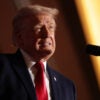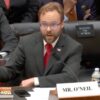Hill Tube has a video up of Speaker Nancy Pelosi (D-CA) talking about the obunlic option “trigger” at yesterday’s news conference. The video does not appear to be embeddable, but here is a rough transcript:
A trigger is an excuse for not doing anything. But everybody’s open to listening to what people have to say. The point is made over and over again that for one reason or another the trigger was not effective in Medicare Part D. … I believe that the bill is the trigger. If anybody wants to … I don’t even want to talk about a trigger. When we’re ready I’ll tell you where we’re going to be.
First of all, Pelosi is correct when she says “for one reason or another the trigger was not effective in Medicare Part D.” Part D, the Medicare prescription drug program, was created under the Medicare Modernization Act of 2003. One reason that the proposed trigger for “a public drug option” failed to get pulled was the huge response of private sector plans entering the program and deliver drugs to seniors at competitive and affordable prices, resulting in a dramatic decrease in the assumed annual premiums for prescription drug coverage.
Private competition, without a “public plan” works very well, thank you very much. But a more important reason that the proposed trigger for that version of the “public plan” was not “effective” was that the “fallback” was not really a “ public plan” for drugs in the first place.
So, Speaker Pelosi is right and wrong at the same time on the same issue. She is right when she says that “trigger” for a “public plan” like that allegedly proposed for Medicare Part D was, in effect, meaningless, and thus she is right to oppose its inclusion in health care legislation. She is also right that the House bill itself is the trigger, and sets up the “public” option to compete against and erode private insurance on a tilted playing field. If she were to adopt a “trigger” mechanism to establish a public plan, sometime in the future, Americans would be dumped of their private coverage by employers and choice and competition would rapidly disappear. The only real purpose of the “trigger” would be to provide a technocratic mechanism for some in Congress to hide behind so that they can personally avoid responsibility for the unpleasant and unpopular consequences. Heritage’s Stuart Butler explains:
What a trigger does is hold off the tough decision until future. The public option would essentially become law today, but not go into effect until an undetermined time when economic conditions could be even worse. It is a travesty of democracy because it allows legislators to vote for a plan now, but passes the blame for the catastrophic consequences onto their successors.
Pelosi believes the public option is the greatest idea since sliced bread. We disagree. But at least we both admit that the trigger is absolutely terrible public policy that is only being floated so some members of Congress can avoid accountability for making the real decisions.






























2 Replies to “Speaker Pelosi Is Right About the Trigger”